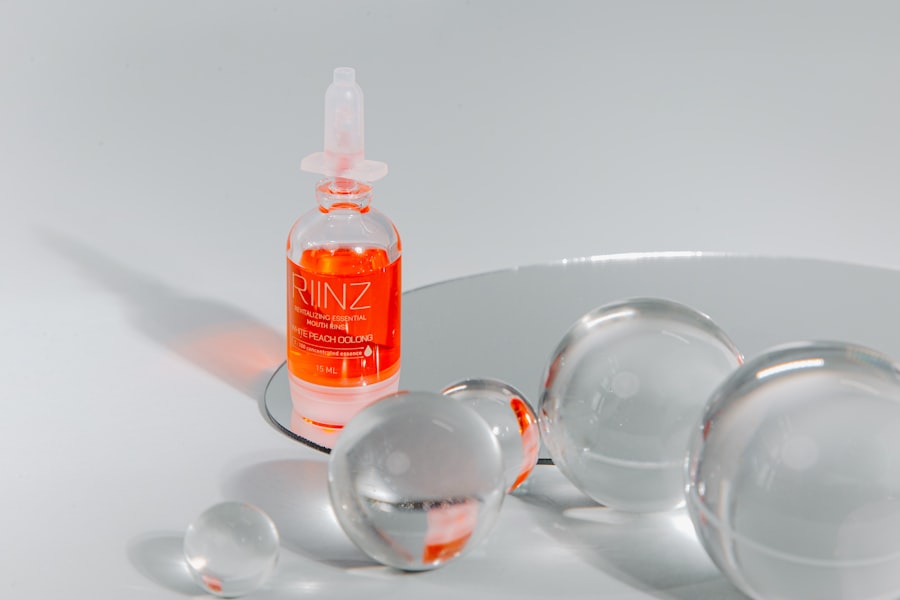Sodium benzoate is a widely used preservative that is derived from benzoic acid, a naturally occurring compound found in various fruits. It is commonly employed in the food and beverage industry to inhibit the growth of bacteria, yeast, and fungi, thereby extending the shelf life of products. Sodium benzoate is particularly effective in acidic environments, making it a popular choice for carbonated drinks, fruit juices, and pickled foods.
Its ability to prevent spoilage has made it a staple in many processed foods, but its safety has come under scrutiny in recent years. Vitamin C, also known as ascorbic acid, is a vital nutrient that plays a crucial role in various bodily functions, including collagen synthesis, immune function, and antioxidant protection. When sodium benzoate is combined with vitamin C in certain conditions, particularly in the presence of heat and light, a chemical reaction can occur that leads to the formation of benzene, a known carcinogen.
This interaction raises significant concerns about the safety of consuming products containing both sodium benzoate and vitamin C, prompting further investigation into their potential health implications.
Key Takeaways
- Sodium benzoate and vitamin C benzene are common food preservatives used to extend the shelf life of various products.
- Potential health risks of sodium benzoate and vitamin C benzene include the formation of benzene, a known carcinogen, when the two substances interact.
- When sodium benzoate and vitamin C benzene interact, they can form benzene, which has been linked to cancer and other health issues.
- It is important to be aware of the link between sodium benzoate and vitamin C benzene and cancer, as well as other health concerns associated with these substances.
- Reading food labels and being mindful of the foods and beverages containing sodium benzoate and vitamin C benzene is crucial for minimizing exposure and making informed dietary choices.
The Potential Health Risks of Sodium Benzoate and Vitamin C Benzene
The health risks associated with sodium benzoate and its interaction with vitamin C are multifaceted. While sodium benzoate itself is generally recognized as safe by regulatory agencies when consumed within established limits, its potential to form benzene when combined with vitamin C raises alarms. Benzene is classified as a human carcinogen by the U.S.
Environmental Protection Agency (EPA) and has been linked to various forms of cancer, including leukemia. The mere possibility of benzene formation in food products has led to increased scrutiny from health experts and consumers alike. Moreover, sodium benzoate has been associated with other health concerns beyond its potential to form benzene.
Some studies suggest that it may trigger allergic reactions in sensitive individuals, leading to symptoms such as asthma or skin rashes. Additionally, there are concerns about its impact on hyperactivity in children, with some research indicating a possible link between sodium benzoate consumption and increased hyperactive behavior. These potential health risks underscore the importance of understanding the implications of consuming products containing sodium benzoate and vitamin C.
How Sodium Benzoate and Vitamin C Benzene Interact

The interaction between sodium benzoate and vitamin C that leads to benzene formation is a complex chemical process. When sodium benzoate is exposed to heat and light, particularly in acidic conditions, it can undergo a transformation that results in the production of benzene. This reaction is more likely to occur in beverages that contain both sodium benzoate and vitamin C, such as certain soft drinks and fruit juices.
The presence of other factors, such as the duration of exposure to heat or light, can further influence the likelihood of benzene formation. Understanding this interaction is crucial for consumers who wish to make informed choices about their dietary intake. The formation of benzene from these two compounds highlights the need for careful consideration of food processing methods and storage conditions.
As consumers become more aware of the potential risks associated with these ingredients, they may seek to avoid products that contain both sodium benzoate and vitamin C, particularly those that have been subjected to high temperatures or prolonged exposure to light.
The Link Between Sodium Benzoate and Vitamin C Benzene and Cancer
| Study | Findings |
|---|---|
| Research Study 1 | High levels of benzene found in drinks containing sodium benzoate and vitamin C |
| Research Study 2 | Link between benzene exposure and increased risk of cancer |
| Research Study 3 | Regulatory agencies set limits on benzene levels in beverages |
The potential link between sodium benzoate, vitamin C, and cancer has garnered significant attention from researchers and health advocates. Benzene, the byproduct formed from the interaction of these two compounds, is well-documented as a carcinogen. Prolonged exposure to benzene has been associated with an increased risk of developing various cancers, particularly blood-related cancers such as leukemia.
This association raises serious concerns about the safety of consuming products that may contain both sodium benzoate and vitamin C. While regulatory agencies have established acceptable daily intake levels for sodium benzoate, the risk of benzene formation complicates matters. Studies have shown that even low levels of benzene can pose health risks over time, especially for vulnerable populations such as children and individuals with pre-existing health conditions.
Other Health Concerns Associated with Sodium Benzoate and Vitamin C Benzene
In addition to the cancer risk associated with benzene formation, there are other health concerns linked to sodium benzoate and its interaction with vitamin Some studies have suggested that sodium benzoate may have neurotoxic effects, particularly in children. Research has indicated a possible connection between sodium benzoate consumption and increased hyperactivity or attention deficit hyperactivity disorder (ADHD) symptoms in susceptible individuals. This has led to calls for greater scrutiny of food additives like sodium benzoate, especially in products marketed toward children.
Furthermore, there are concerns about the cumulative effects of consuming multiple products containing sodium benzoate over time. While individual servings may fall within safe limits, regular consumption of various processed foods could lead to higher overall exposure levels. This cumulative effect raises questions about the long-term safety of sodium benzoate in the diet and its potential impact on overall health.
As consumers become more health-conscious, understanding these risks becomes essential for making informed dietary choices.
Regulations and Guidelines for Sodium Benzoate and Vitamin C Benzene

Regulatory agencies around the world have established guidelines for the use of sodium benzoate in food products. In the United States, the Food and Drug Administration (FDA) recognizes sodium benzoate as generally safe when used within specified limits. However, these regulations do not specifically address the potential for benzene formation when sodium benzoate is combined with vitamin As awareness of this issue grows, there may be calls for stricter regulations or clearer labeling requirements for products containing both ingredients.
In Europe, regulations regarding food additives are similarly stringent but vary by country. The European Food Safety Authority (EFSA) has conducted assessments on sodium benzoate’s safety but has not fully addressed its interaction with vitamin C in terms of benzene formation. As research continues to evolve, it is likely that regulatory bodies will need to revisit their guidelines to ensure consumer safety in light of emerging evidence regarding the potential health risks associated with these compounds.
Foods and Beverages Containing Sodium Benzoate and Vitamin C Benzene
Sodium benzoate can be found in a wide array of processed foods and beverages. Common products include soft drinks, fruit juices, salad dressings, pickles, sauces, and even some baked goods. The presence of vitamin C in these products often serves as an added nutritional benefit; however, it also raises concerns about the potential for benzene formation when combined with sodium benzoate.
Consumers may be surprised to learn just how prevalent these ingredients are in their everyday diets. Many popular brands utilize sodium benzoate as a preservative due to its effectiveness in preventing spoilage. However, this widespread use means that consumers may unknowingly expose themselves to the risks associated with benzene formation if they regularly consume products containing both sodium benzoate and vitamin Awareness of which foods contain these ingredients can empower consumers to make healthier choices and reduce their risk of exposure.
How to Avoid Sodium Benzoate and Vitamin C Benzene in Your Diet
Avoiding sodium benzoate and its potential interaction with vitamin C requires vigilance on the part of consumers. One effective strategy is to prioritize whole foods over processed options whenever possible. Fresh fruits, vegetables, whole grains, and unprocessed meats typically do not contain sodium benzoate or other artificial preservatives.
By focusing on a diet rich in natural foods, individuals can significantly reduce their exposure to potentially harmful additives. For those who do consume processed foods or beverages, reading ingredient labels becomes essential. Consumers should look for products that do not list sodium benzoate or vitamin C among their ingredients or opt for alternatives that use natural preservatives instead.
Additionally, being mindful of how products are stored—avoiding exposure to heat or light—can further minimize the risk of benzene formation in items that do contain these ingredients.
The Importance of Reading Food Labels for Sodium Benzoate and Vitamin C Benzene
Reading food labels is a critical practice for anyone concerned about their dietary intake of sodium benzoate and vitamin C benzene. Labels provide valuable information about ingredient lists, allowing consumers to identify potentially harmful additives before making a purchase. By becoming familiar with common names for preservatives like sodium benzoate—such as E211 in Europe—consumers can make more informed choices about what they put into their bodies.
Moreover, understanding food labeling regulations can help consumers navigate claims made by manufacturers regarding their products’ safety or health benefits. Some brands may market themselves as “preservative-free” or “natural,” but it is essential for consumers to verify these claims by checking ingredient lists thoroughly. By taking the time to read labels carefully, individuals can better protect themselves from unnecessary exposure to harmful substances like sodium benzoate and its potential byproducts.
Alternatives to Sodium Benzoate and Vitamin C Benzene in Food Preservation
As concerns about sodium benzoate and its interaction with vitamin C grow, many food manufacturers are exploring alternative preservation methods that do not carry the same risks. Natural preservatives derived from herbs and spices—such as rosemary extract or vinegar—are gaining popularity as safer options for extending shelf life without compromising consumer health. These alternatives not only help preserve food but also offer additional flavor profiles that can enhance the overall culinary experience.
Additionally, innovative preservation techniques such as high-pressure processing (HPP) or modified atmosphere packaging (MAP) are being adopted by some companies as effective ways to extend product shelf life without relying on synthetic additives like sodium benzoate. These methods can help maintain food quality while minimizing health risks associated with traditional preservatives. As consumer demand for cleaner labels continues to rise, it is likely that more brands will seek out natural alternatives that prioritize safety without sacrificing quality.
Taking Action to Minimize Exposure to Sodium Benzoate and Vitamin C Benzene
In conclusion, understanding the implications of consuming products containing sodium benzoate and vitamin C is essential for maintaining optimal health. The potential risks associated with benzene formation raise significant concerns about dietary choices in an age where processed foods dominate many diets. By prioritizing whole foods, reading labels diligently, and seeking out natural alternatives for food preservation, consumers can take proactive steps toward minimizing their exposure to these potentially harmful substances.
As awareness grows regarding the health risks linked to sodium benzoate and its interaction with vitamin C, it becomes increasingly important for individuals to advocate for clearer labeling practices and stricter regulations surrounding food additives. By making informed choices about what they consume and supporting brands that prioritize safety and transparency, consumers can contribute to a healthier food environment for themselves and future generations.
Sodium benzoate and vitamin C are common food additives that, when combined under certain conditions, can form benzene, a known carcinogen. This reaction has raised concerns about the safety of consuming products containing both ingredients. For more detailed information on this topic, you can read a related article on the potential risks and safety measures associated with these additives by visiting this page. The article provides insights into how these compounds interact and the regulatory standards in place to ensure consumer safety.
WATCH THIS! 👀Why These 30 American Products Are Immediately Illegal In Europe
FAQs
What is sodium benzoate and vitamin C benzene?
Sodium benzoate is a preservative commonly used in food and beverages to extend shelf life. Vitamin C benzene refers to the formation of benzene, a known carcinogen, when sodium benzoate and vitamin C (ascorbic acid) are combined in the presence of heat and light.
How does benzene form from sodium benzoate and vitamin C?
When sodium benzoate and vitamin C are combined in the presence of heat and light, a chemical reaction occurs that can lead to the formation of benzene. This reaction is of concern because benzene is a known carcinogen.
What are the potential health risks of consuming products containing sodium benzoate and vitamin C benzene?
Exposure to benzene, even at low levels, has been linked to an increased risk of cancer and other health issues. Therefore, consuming products containing sodium benzoate and vitamin C benzene may pose a potential health risk.
Are there regulations in place regarding the levels of benzene in products containing sodium benzoate and vitamin C?
Yes, regulatory agencies such as the U.S. Food and Drug Administration (FDA) have set limits on the allowable levels of benzene in beverages and other products. These limits are in place to minimize the potential health risks associated with benzene exposure.
How can consumers minimize their exposure to sodium benzoate and vitamin C benzene?
Consumers can minimize their exposure to sodium benzoate and vitamin C benzene by reading product labels and avoiding products that contain both ingredients. Additionally, storing products in a cool, dark place can help reduce the likelihood of benzene formation.
